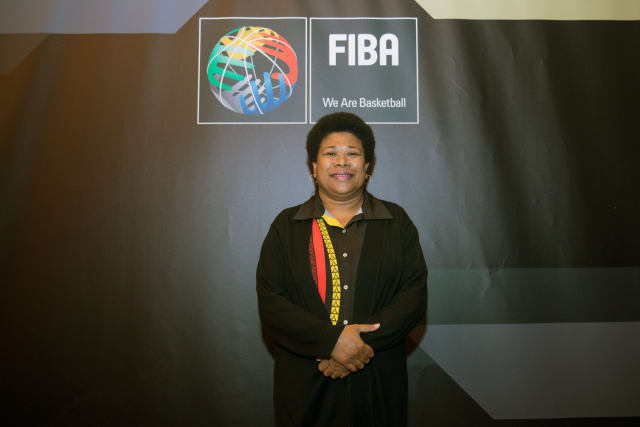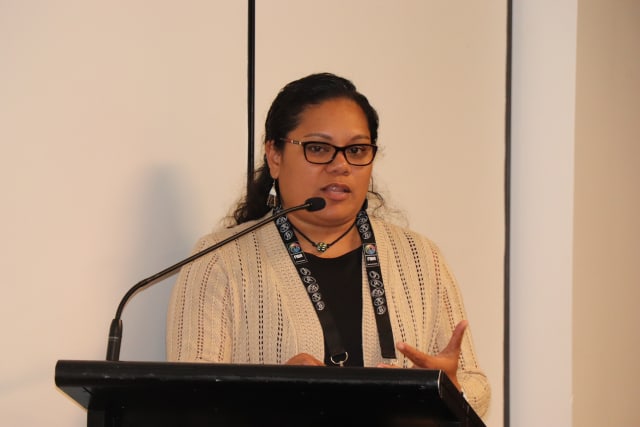Women leaders in Oceania paving the path for the future of basketball
GOLD COAST (Australia) - Pacific Women basketball leaders are leading the way in the growth of basketball in the region with fresh perspectives and innovative approaches to developing the game.
GOLD COAST (Australia) - Pacific Women basketball leaders are leading the way in the growth of basketball in the region with fresh perspectives and innovative approaches to developing the game.
According to a Russell 1000 report, in 2018, female leaders held 20.8% of the board seats listed on corporate boards.
With a review of the current board members of National Federations in the Oceania region, over 34 percent of the members were female individuals including FIBA Oceania Board Members, Karo Lelai of Papua New Guinea and Jubilee Kuartei of Palau
“One of FIBA’s pillars of objective in this strategic cycle is Women in Basketball, and the continuous growth we have in the region is impressive whether on or off the court,” FIBA in Oceania Senior Manager Amanda Jenkins shared.
“With capable management and women leaders on the board of our national federations, we will continue to improve our diversity and approach in developing the game in Oceania,” she added.
Some of the highlights of Women in Basketball in the region were the first all-female technical crew that officiated a women's basketball game in the Pacific Games in 2019 and FIBA's office in Oceania currently has over 75 percent, full-time female employees.

Photo: Lelai attending the FIBA World Congress
FIBA reached out to the female board members to get their thoughts as leaders in their respective Federations.
Lelai serves as the Basketball Federation of Papua New Guinea's (BFPNG) President and is also part of the FIBA Central Board and mentioned that there is still room for improvement in leadership roles in Papua New Guinea.
"It is still very much a man's world," shared Lelai regarding the basketball scene in Papua New Guinea.
" I have to prove myself every day in this job because there are still doubts in our capabilities as leaders. However, I must still commend the PNG, basketball family. In my personal view, we are light years ahead of many other sports in terms of gender equity," she added.
Lelai is the first female President in the history of BFPNG, and in her term as leader, the Federation performed well in 2020 with its innovation and adaptability despite the pandemic. BFPNG revised its community programs and targeted provinces outside of Port Moresby to alleviate the lost opportunities with government-imposed lockdowns in the capital.
Lelai stressed the importance of diversity in leadership as a key factor in the growth of any organization.
"Diversity at the decision-making level assists to ensure a much better outcome. Even more importantly, females, who are often nurturers in the home, will be more mindful of and will pay more attention to athlete welfare or protection and gender-smart decision making," she shared.
"Given the statistics of gender-based violence in PNG, sport is a powerful platform for survivors to tell their story and empower other women to take proactive steps to protect themselves. Sport has a responsibility to facilitate women empowerment.," she added.

Photo: Kuartei during the 2019 FIBA Oceania Zone Assembly
Meanwhile, Palau's Kuartei is the youngest Board Member in the Palau Basketball Federation (PBF), while also serving as a member of FIBA's commission on the Working Group on National Federations Development.
"Despite being the youngest in the Board (PBF), I believe I was acknowledged because of my hands-on experience in basketball as a former player, a former elite referee, and my experience with the administration for 20 years," shared Kuartei.
Kuartei shared that Palau's matriarchal society has helped her work as the Federation's Secretary-General that is supportive of her decisions for Palau basketball.
"With Palau Basketball, I have never felt any unequal treatment as a female leader. Being a woman, and the youngest of our board, it has been an honor to serve with a team of great leadership on the Palau Basketball Federation board," she said.
The Palau native emphasized the importance of role models in society, especially from a leadership perspective.
"I feel it's important to be that role model for the young girls in our sport, but also our communities. Through basketball, as female leaders, we have a greater voice and responsibility to our communities and countries," Kuartei said.
The growing number of women playing basketball in the region was apparent in the last year. In reference to the Development Participation numbers of Pacific countries in 2020, women in basketball participation have increased to 28 percent.
The influx of female leaders in the region has certainly given avenues for women to showcase their talent and leadership in the management sector.
Whether in the form of providing a diverse opinion, role models for the youth, or professional skills to the table, their contributions are not to be understated and could be the key for basketball to take the next level in the Pacific.
FIBA